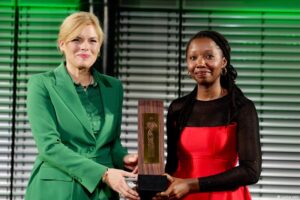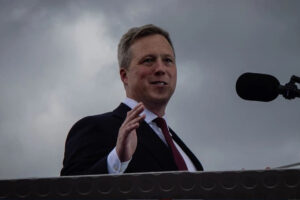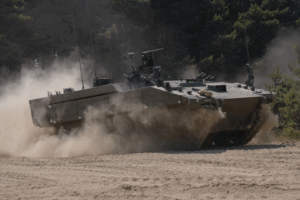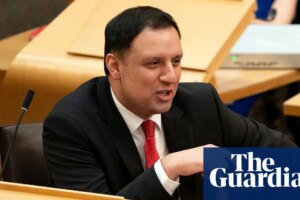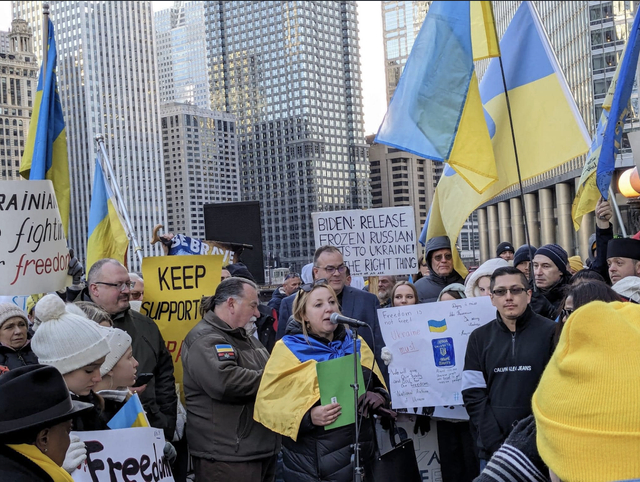
Russia’s first invasion of Ukraine in 2014 galvanized the diaspora to advocate more forcefully in the United States. New groups formed, and activists on both sides of the Atlantic worked to raise awareness of Ukraine’s plight.
For those still hesitant to get involved, Russia’s full-scale invasion in 2022 erased any doubts. At home, Ukrainians took up arms to defend their freedom. Abroad, diaspora communities mobilized, rushing to connect with their representatives in Congress to press for weapons, aid, and political support.
JOIN US ON TELEGRAM
Follow our coverage of the war on the @Kyivpost_official.
Now, with the full-scale invasion well into its fourth year, questions are emerging about what role diaspora advocacy has actually played in shaping US policy. Ukraine’s cause has also become entangled in American partisan battles.
With Russia pressing harder on the battlefield, Ukraine’s survival depends not only on weapons and aid from Washington but also on the voices that shape America’s resolve. In the United States, those voices come from the Ukrainian diaspora, a community that has mobilized across generations and political lines to press lawmakers for support.
Yet the larger movement remains fractured, often divided by generational, political and religious differences, and often left adrift by a government in Kyiv that has struggled to engage its far-flung advocates.
To remain effective, the diaspora will need to evolve, finding ways to unite its disparate parts into a force capable of sustaining American support in the years ahead.
Other Topics of Interest
Ukraine Welcomes US Signals on Possible Tomahawk Missile Transfer
Kyiv says talks with Washington on providing Tomahawk cruise missiles are progressing, with both sides working out technical and operational details of potential delivery.
A diaspora split between nationalism and faith
That fragmentation is rooted in history. The Ukrainian American community is far from monolithic, shaped by different waves of immigration that brought their own worldviews, priorities, and identities.
Those who arrived before and after World War II were often highly educated and staunchly nationalistic, forming the backbone of the diaspora’s cultural elite. They built enduring institutions – newspapers such as The Ukrainian Weekly, cultural associations, and early advocacy groups – that gave the community visibility in American life.
The newer waves of immigration, particularly after the 1980s, looked very different. Many of those who arrived were evangelicals and Jews who had faced persecution in the Soviet Union.
For these communities, religious identity often outweighed a strong attachment to Ukrainian national identity, setting them apart from the earlier arrivals. The contrast was especially sharp when compared with the older diaspora clusters in Pennsylvania and New York, which were rooted in Greek Catholic and Orthodox traditions and steeped in nationalist politics.
Andrij Dobriansky, director of communications and media at the Ukrainian Congress Committee of America, noted that Baptist and Pentecostal congregations rarely engaged with united diaspora institutions. “They were less interactive with broader diaspora groups, largely due to cultural differences,” he said, pointing to restrictions on folk traditions, abstinence from alcohol, and a strict adherence to remaining non-political.
Andrij Dobriansky, Communications Director for the Ukrainian Congress Committee of America at work in his office. Photo: Ukrinform.
Today, Washington state holds the third-largest Ukrainian population in the United States, after California and New York. According to Census Bureau data, Ukrainians are also the fastest-growing European immigrant community in the state.
Many of the Ukrainians fleeing the war since Russia’s full-scale invasion in 2022 have also been Protestants, joining family and friends who had already established congregations and communities in the United States. This newest wave has further reinforced the evangelical character of Ukrainian life in places like Washington.
One Ukrainian Protestant refugee who arrived in the United States after 2022 told me they were stunned to discover how many in the local Protestant diaspora openly supported Donald Trump. Even in the 2024 US presidential elections, many in the Ukrainian diaspora were divided on who to vote for.
“Ukrainian identity is not strong among most Protestants – religion is the predominant factor in their identity,” said Oleh Wolowyna, director of the Center for Demographic and Socio-Economic Research of Ukrainians in the US at the Shevchenko Scientific Society in New York.
Many Ukrainian Protestants who first settled in Washington and California later moved to more conservative states like the Carolinas, Georgia, and Kentucky. Kentucky now has a sizable Ukrainian Protestant community. In central Kentucky alone, an estimated 5,000 people of Ukrainian descent live in Nicholasville, making it one of the largest concentrations in the state.
Yet community organizers who advocate in the US Congress told me they did not know a single Ukrainian from the state involved in national organizing.
It remains a significant opportunity for established advocacy groups to build ties with Ukrainian Protestant communities in Republican-leaning states, which have historically stayed away from organized advocacy.
Church of Blessing, an Evangelical church in Federal Way, Washington, was founded several decades ago and is primarily composed of ethnic Ukrainians, along with members from other parts of the former Soviet Union. Photo: Church of Blessing.
I am the son of Ukrainian Protestant refugees who came to the United States in 1989. Over time I came to understand more about the older diaspora, but it was clear they were different – not only from Protestant communities in America, but also from Ukrainians in Ukraine itself. Many from the earlier waves are now second- or third-generation, with ties to the homeland that have steadily faded.
As Taras Kuzio, a political science professor at the National University of Kyiv-Mohyla Academy, put it, “Remember, the OUN generation – those born in the 1910s and 1920s in interwar Poland – are no longer with us. Their children are generally far less committed to Ukraine.”
In my efforts to bridge the two communities over the years, I found it difficult to connect with leaders of the larger Ukrainian diaspora organizations, despite my hope of uniting the different diasporas, even if only in part.
Ukrainian Congress Committee of America (UCCA)
Founded in 1940, UCCA is the largest umbrella organization of Ukrainians in the United States. Based in New York with a Washington bureau, it unites more than 30 national groups and represents over a million Americans of Ukrainian descent.
For decades, UCCA has convened national congresses, run refugee relief programs, and lobbied US lawmakers through its Ukrainian National Information Service. It is also a founding member of the Ukrainian World Congress (UWC), linking Ukrainian Americans to the wider global diaspora.
One of the first individuals I was able to get a hold of following the full-scale invasion to talk about the different diaspora communities was Dobriansky. He has become a visible force in diaspora advocacy, representing a new generation of leaders pushing to reform established organizations – making them more open-minded, pragmatic, and results-driven.
That generational shift is visible across the UCCA. In Illinois, Mariya Dmytriv-Kapeniak, UCCA’s state president and a member of its national executive board, has also been part of efforts to modernize the group and broaden its reach.
“We need stronger political connections and more influence in the US political sphere,” she told me. “Very few people of Ukrainian descent are running for Congress or serving in local government. UCCA could play a key role in fostering political participation, but it must start with outreach to youth organizations like Plast, student clubs, and civic organizations.”
Dmytriv-Kapeniak described the efforts of the Illinois chapter of UCCA – where they brought eight students from Chicago to Washington for advocacy last year – as a small start, but said they need to be scaled nationwide. Too often, she noted, UCCA still relies on outdated communication like one-way emails, leaving younger members disengaged.
This generational divide is not new. Vic Satzewich, a Canadian sociologist and author of “The Ukrainian Diaspora,” notes that Ukrainian community institutions in North America have long been dominated by older generations who control church hierarchies and cultural associations, often leaving little room for younger Ukrainians to lead or innovate. This pattern has persisted for decades, creating a cycle where younger members feel excluded and disengaged from established diaspora structures.
Ukrainian-American community leaders, including Yuriy Makar (SD), Olga Zacharkiv (MI), Nataliya Kukhar (IA), Andriy Ovod (WI), Michael Sawkiw, Halyna Salapata (WI), Mariya Dmytriv-Kapeniak (IN), and Svitlana Iurchuk (IL), during a lobbying visit to Washington, D.C., in support of continued U.S. aid to Ukraine. Photo: Mariya Dmytriv-Kapeniak
Dmytriv-Kapeniak believes that new leadership is required to lead the organization. “UCCA needs new leadership and a fresh approach,” she argued. “Too often, leadership has remained the same for decades, and branches are dying because they aren’t bringing in new members. Recent arrivals under U4U or refugee programs are not being integrated. Community building is critical but has not been prioritized.”
She has repeatedly urged the group to adapt its messaging to undecided Republicans in Congress but said those proposals often go nowhere. “Instead of enhancing each other’s work, organizations sometimes act as though others don’t exist,” she added, pointing to wasted duplication across advocacy groups.
While younger leaders push for modernization, Michael Sawkiw Jr., president of UCCA, insisted that the organization remains open to evolving. “Advocacy has to adapt with each generation,” he said. “What never changes is the need to speak with one voice for Ukraine. Whether it’s students on Capitol Hill or long-standing institutions like ours, the more unified we are, the more effective we become.”
New players and new divisions in the diaspora
One of the other main advocacy groups to emerge is Razom for Ukraine, founded in 2014 by volunteers like Lyuba Shipovich. Razom was one of the earliest organizations to emerge, following the Maidan protests. The group became a major hub for humanitarian relief and diaspora organizing after Russia’s first invasion.
But by 2023, internal divisions over its mission led to a split. Some leaders wanted Razom to remain focused strictly on humanitarian assistance, while others argued that they needed to directly support Ukraine’s military effort.
Shipovich and others left the organization and went on to co-found Dignitas Ukraine, which has since become a leading player in channeling resources and technology to Ukraine’s armed forces.
Lyuba Shipovich, co-founder of Razom for Ukraine and current CEO of Dignitas, at a training facility for ground robotic systems in Ukraine. Photo: David Kirichenko
Dmytro Kavun, co-founder and president of Dignitas, recalls how the debate reached a breaking point. “You can’t win a war with humanitarian aid alone,” he said. “If there are no defenders, there are no civilians.”
From his perspective, effectiveness is measured by whether an organization is willing to equip soldiers on the front line. “Some charities, like Nova Ukraine, are clear that they don’t. Others, like United Help Ukraine, combine humanitarian and military support.”
Kavun added, “At Dignitas, our motto is simple: drones save lives. One drone can save up to 50 soldiers. That’s why we’ve committed fully to technology and defense.”
At the same time, Razom began moving into political advocacy. Following advice from Zaher Sahloul of MedGlobal – who had guided Syrian-American advocacy during Russia’s war in Syria – Razom helped create the American Coalition for Ukraine (ACU) and launched the Ukraine Action Summit, even opening a Washington DC office to focus on coalition building.
These were promising steps, but one interviewee told me that Razom later pulled back from the ACU after leadership disputes and as Nova Ukraine became more prominent.
Maria Marini, an ACU delegate from Houston, further highlighted the challenges: “UCCA is well-established and the organization has cultivated relationships in Washington that can be leveraged very effectively at a policy level,” she told me.
“However, as we saw in the fall and early spring of 2024, a broader advocacy was required to move congressional offices away from the ‘retail politics’ they felt they needed to play with their constituencies, who were parroting a lot of false narratives unfavorable to Ukraine.”
In her view, congressional offices found it easier to support Ukraine when they could point to constituents demanding it. That was the gap younger coalitions stepped in to fill. “The younger and more media-savvy teams used technology and networking to amass volunteers who would bring their pro-Ukraine messages to the Hill.”
U.S. Senator Maria Cantwell poses for a photo with the ACU delegation from Washington State. Photo: David Kirichenko
Indeed, Razom’s path highlights a larger trend in the diaspora. Younger groups like Razom, Nova Ukraine, and ACU bring energy, resources, and organizational skills, but their progressive politics and closed leadership circles have sometimes pushed away conservatives who might otherwise back Ukraine.
This is especially important as much of the recent Ukrainian diaspora are conservative Protestants.
Others I interviewed told me that older organizations like the UCCA remain stuck with entrenched leaders and slow to reform. The result is a diaspora advocacy movement that is energetic and well-funded but also fragmented – driven by passion yet often limited by infighting, political divides, and inexperience in navigating America’s polarized system.
Still, many activists are crossing organizational boundaries for the common cause, while leaders are borderline competing, according to activists I spoke with. At the same time, the fragmented landscape of advocacy groups gives outsiders the ability to pick and choose where they feel most comfortable lending their support.
Critiques of the Ukrainian diaspora
Not everyone agrees on how effective diaspora advocacy has been. “The biggest sin of the diaspora is that it has not organized an information campaign for Ukraine,” said Kuzio.
“The Ukrainian diaspora has organized very few media articles, no podcasts, and only a few round tables and conferences.” One reason, Kuzio believes, is because the North American diaspora has always been focused on history and culture – not on contemporary politics.
Kuzio added, “All the podcasts are by Russianists giving a pro-Russian angle. The diaspora does not use social media like X and therefore does not support Ukraine on these platforms.”
Alexander Motyl, a professor of political science at Rutgers University-Newark, struck a similar note of caution. “Eastern Europeans, and Ukrainians especially, have no clout and therefore do not count on the federal or state level. They have little money, and their numbers are too small to matter: about 1.25 million Ukrainians scattered about, with no significant electoral weight.” By contrast, there are roughly 9 million Poles, with a strong base in places like Chicago.
Motyl added that “Eastern Europeans and Ukrainians have been able to get some symbolic concessions such as Captive Nations, the Shevchenko and Holodomor monuments in Washington, and they may exert some influence at critical junctures, for example Speaker Johnson’s support of funding for Ukraine.” Still, he said, “the Ukrainian diaspora is not a force to be reckoned with.”
Members of the Ukrainian diaspora in Washington State gathered in Seattle in March 2025 to show support for Ukraine. Photo: David Kirichenko
Ilona Sologub, an editor at Vox Ukraine, offered a similar assessment. “Given the limited support Ukraine receives from the United States, the Ukrainian lobby is probably not that strong,” she said.
Others, however, see the diaspora’s record more favorably. Mark Temnycky, a journalist whose grandparents on both sides came from Lviv, emphasized the impact that the diaspora is having. “The Ukrainian-American diaspora has been very engaged during the war, and continues to do so,” he said.
“Various Ukrainian-American organizations have raised tens of millions of dollars to help Ukraine. Many members from the community have also met with their elected officials to inform them about the war and its significance,” Temnycky said.
He added, “The Ukrainian-American community is helping make a difference in the war, and both the Ukrainian government as well as the Ukrainian Embassy in the United States have thanked the Ukrainian-American community for their hard work.”
“The Ukrainian-American community is a powerful lever of influence – yet state interaction with it remains unsystematic. As a result, community energy generates many valuable initiatives, but they arise spontaneously and in different directions,” said Lukian Selskyi, editor in chief of Vilni Media.
Kyiv’s ties to the diaspora
For its part, the Ukrainian government has made a deliberate effort to strengthen ties with the diaspora before the full-scale invasion. In 2020, Kyiv created a dedicated post – the Minister for Foreign Affairs of Ukrainians Worldwide – tasked with coordinating outreach to diaspora communities. Under the Law of Ukraine “On Ukrainians Worldwide,” the Ministry of Foreign Affairs is tasked with maintaining cooperation with diaspora communities and supporting their cultural, educational, and linguistic needs.
As Selskyi noted, “Ukrainian diplomacy in the US lacks strong channels and modern tools for engaging with public opinion. Too often, what emerges is an information vacuum with no unified messages, no communication campaigns, and no clear dialogue either with ordinary Americans or with elites in different states.”
“Kyiv’s current priority is supporting Ukrainians in Europe, though cooperation with the Americas remains critically important, given the strong institutions, political influence, and government representation of Ukrainian communities there,” says Serhii Kuzan, chairman of the Ukrainian Security and Cooperation Center.
The Canadian diaspora has better organization in North America. “Canada’s diaspora is considered the most organized, but the role of Ukrainians in the United States is also vital, as they actively shape public opinion and political processes, including lobbying for US support of Ukraine.”
At the same time, the government is grappling with the broader challenge of keeping Ukrainians inside the country. With millions displaced abroad, officials have debated how to balance mobility with national needs.
This year, Kyiv introduced new rules allowing men aged 18–22 to travel abroad, hoping to curb the exodus of teenagers leaving at 17. “We want Ukrainians to maintain ties with Ukraine as much as possible,” Prime Minister Yulia Svyrydenko wrote on Telegram.
Yet while Kyiv tries to shape policy at home, diaspora leaders often feel shut out of meaningful communication. “In the first few years, there was a lot of frustration with the lack of real communication between the government of Ukraine and diaspora leaders. We wanted to advocate for what was most needed, but it was very hard to get that information from Kyiv,” said Dmytriv-Kapeniak.
A rally in Chicago commemorating Ukraine’s Independence Day on Aug. 24, 2025. Photo: David Kirichenko.
At one point, she recalled the Ukrainian Prime Minister’s visit to Ukrainian Village in Chicago, saying the meeting “was just a PR stunt. They weren’t productive or helpful for our actual work. That led to frustration and mistrust.”
She added, “Even my generation knows how ineffective the government can be and how many layers of bureaucracy exist.”
Diaspora leaders sometimes travel to Kyiv for meetings, but there’s rarely any real feedback. “If someone meets with President Zelensky, for example, there should be a debrief afterward: this is what we discussed with the government, and this is how we should align our advocacy going forward,” Dmytriv-Kapeniak said.
“That kind of structured follow-up is missing, which only adds to the disconnect.”
What comes next
Since the outbreak of the full-scale invasion, around 240,000 Ukrainian refugees have come to the US. I met many of them in Tijuana, where I volunteered as a translator in the early months of the war. Many were Protestant Ukrainians joining family and friends already settled in America.
Today, in cities like Seattle and Sacramento, these communities are undergoing a revitalization, with Ukrainian businesses and cultural centers taking root to meet the needs of new arrivals. On the streets, the sound of Ukrainian is once again a daily presence.
As Selskyi observed, “These people are the ‘fresh blood’ of the diaspora: they have witnessed the war, they are motivated, and they are inclined toward advocacy and volunteering. Ukrainians should not be left in uncertainty – their potential must be integrated into a broader strategy of cooperation with the United States.”
Still, with time, engagement has declined. “Unfortunately, with each year of war, this activism has declined somewhat, making it especially important to maintain constant dialogue and to express gratitude to Ukrainian organizations and individuals who keep the world from forgetting about Ukraine,” explained Kuzan.
The challenge now is to channel the energy of these new arrivals into established institutions, while infusing older organizations with their momentum. That will require more than a general mobilization, but a rethinking of how the diaspora organizes, and a renewal of leadership with fresh energy.
It will demand systematic channels of communication with Kyiv, the bridging of generational and political divides within the diaspora, and messages crafted to resonate across America’s partisan landscape.
Only then can the Ukrainian diaspora realize its full potential and speak with a stronger, more unified voice in the halls of power in the nation’s capital.
